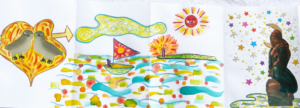from Where Here Were We
A Collaborative Series by Charles Bernstein and Norman Fischer
 One panel from: Susan Bee, Windswept, 2020, leporello, 86” long x 6.125” high.
One panel from: Susan Bee, Windswept, 2020, leporello, 86” long x 6.125” high.
LINKS TO POEMS:
"MARCH 25-APRIL 13" | "APRIL 14-16" | "APRIL 17-18" |
"APRIL 19-20" | "APRIL 20-23" | "MAY 22-JUNE 5"
A Note on the Work
Norman Fischer, as told to Charles Bernstein
We didn't decide to collaborate. Somehow, in these timeless pandemic days, nothing stays clear, everything seems to happen somehow or other. I sent a funny message to Charles via FB messenger and he responded, spontaneously, and then, without knowing it, we realized we were writing poems. My responses were sometimes parts of lines from other poems I was writing, though Charles didn’t know this. I figured he’d like the idea that the lines are not the “same” in different context. He said he did.
Since FB messenger has a small window for text, we were nudged toward short lines. Charles is three hours ahead of me in time zone (he lives in Brooklyn and I’m in the Bay Area), so I'd often wake up in morning to find his lines from day before and then quickly respond, though sometimes I’d respond later, with his lines in my mind all day. There was a lot of what’s I’d call true collaboration, that is, building on what the other had done, taking it further, rather than pushing/pulling. Charles's rhythms in writing are very strong. I found myself following them (so I was also taking a very informative course in how to write poems à la Charles) and riffing.
Charles edited the poems, as he is editing (and spinning) this introduction. After one of us declared a poem finished, he would sometimes significantly reorganize our improvisations and often sloppy parries into something almost elegant. Elegant in a clumsy way –– Charles and I share a preference for clumsiness; elegance seems so needlessly high class and so kind of crass. I would then almost invariably find these final versions delightful, proposing no or only a few minor changes.
Charles and I know one other and our works very well. We’ve been reading each other since we met in the early 1980s. Our work speaks to each other in very close ways –– he writes the poems I would write in my alternative universe. Likewise, “High Tide at Race Poin” (Near/Miss) is dedicated to me and, Charles told me, is his way of writing in my spirit. And I’ve more than once dedicated poems that appear in my books to Charles, though I probably failed to mention this to him and he may not have noticed. I mean, I hear myself in Charles’ poems, they are very close. So in collaborating (which we have never done before) we enter into a hall of mirrors. My lines, it seems to me, strain toward something beyond them, some “subject matter” some “meaning” (I put these words in scare quotes because although the lines do strain toward that, they don’t actually believe that there is a “subject matter” or “meaning” in poems beyond what the words say). Doubt in language as “effective” is always there in my words. I have the feeling that for Charles words do do what they are supposed to do — either he isn’t straining toward something outside them, is content with what they are on their own, or, if he is straining, he is succeeding in getting to what he is straining toward. This means my words are more discursive and full of self-inflicted wounds. His are straightforwardly as they are, full of sound and wit and completely affirmative (strange as that may be to say about someone whose work is often so dark). This dynamic could have made for disjunction in the collaboration if we had resisted one another with our divergent sensibilities. But that didn’t happen because Charles was, in effect, the editor, his overarching sense of words (which I do not not share) ended up folding my disability with words into the words, so my issue and problem with language was redeemed and could express itself without the usual chinks and gaps that appear in my own work.
Oddly, this collaboration seems to me to be to be more characteristic of my own work than my own work! (Or anyway, better than my work, realizes my work better than my own work does!) Or let’s just say better for the time being that is the work.
For the audio recordings, we decided to each read the poem we began on March 25, the second poems in the series. We each seem to like each other’s reading more. Charles wrote me that he loved the even pacing, the quick movement that still cleaved to the poem’s rhythms, and the fact that I didn’t spin the words but left them more on their own. He said I gave space for the listener to enter into the poem. And he noted that I read much faster than he did, “trippingly on the tongue.” I found his reading very moving –– dramatic, serious, and emotional; committed to the poem and its “meaning.” Even if the meaning here goes beyond “meaning” in conventional sense, I can absolutely hear it in Charles’s performance. I appreciated the drama of his reading because it didn’t sound at all ironic (as his dramatic reading style often does, skirting bathos). Charles expressed some bemused skepticism about his dramatic performance style. But to me he sounded truly moved by the strange musical sadness of the new meanings we were creating. I found it very emotional.
